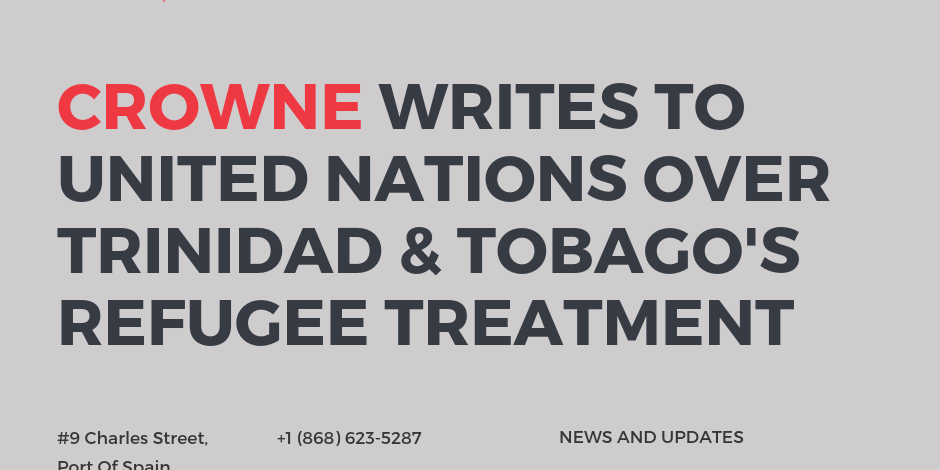Chamber member, Dr. Emir Crowne, was in the Trinidad and Tobago news for the past couple days over a letter he wrote to the United Nations commenting on Trinidad and Tobago’s inhumane treatment of Venezuelan Refugees.
According to LoopTT, “Trinidadian attorney Emir Crowne has written Special Procedures at the Office of the United Nations High Commissioner for Human Rights (OHCHR) calling for an investigation into alleged human rights abuses involving refugees and asylum seekers in Trinidad and Tobago.”
The TTT news broadcast and the article about Dr. Crowne can be found below. All following text in this post is quoted from an article posted by LoopTT. If you would like to see the article on LoopTT’s website, click HERE:
According to a source, the letter, which was submitted over the weekend, called for ‘urgent action’ as Trinidad and Tobago is a signatory to the 1951 Refugee Convention.
Crowne referred to Attorney General Faris Al-Rawi’s statements that there are no refugee laws in Trinidad and Tobago as well as recent media reports from refugees and asylum seekers of abuse at the hands of police officers and immigration officials at the Immigration Detention Centre.
Crowne said however that a draft policy document shows that government’s practice of not recognizing refugee rights conflicts with international legal obligations.
“I write today with respect to the appalling human rights abuses that have evidently arisen, and continue to arise, among refugees in Trinidad & Tobago.”
“Despite being a signatory to the 1951 Convention, and 1967 Protocol, Trinidad & Tobago has not developed domestic legislation to deal with refugees. This has evidently led to the State practice of not recognizing any refugee rights (the “Practice”).
The Honourable Attorney General of Trinidad & Tobago is on record as stating that Trinidad & Tobago has no “refugee laws” (see here and here). Similarly, Trinidad & Tobago’s Minister of National Security has characterized its obligations as being “moral” ones as opposed to legal ones (see here).
However, this Practice flies in the face of Trinidad & Tobago’s most basic obligations under international law. Namely, the (1) determination of refugee status and (2) non-refoulment. Therefore, the Government’s position that there are ‘no refugee laws’ is patently false and a violation of its international law obligations at the very least.
“It is because of this Practice that refugees are evidently subject to abuse, rape, exploitation and human trafficking (see here, here, here and here).”
Crowne said government is playing politics with the lives of refugees.
“The Government is playing politics with the basic human rights of refugees, and it is wrong.
Furthermore, this Practice has also led to a prime facie breach of Trinidad & Tobago’s non-refoulment obligations,” Crowne said, referring to the forcible deportation of 82 Venezuelans in April 2018, some of whom were asylum seekers.
On January 19, 2019, refugees and asylum seekers held a media briefing to tell media their stories of abuse at the hands of some officials. They intend to submit a petition to Prime Minister Dr Keith Rowley calling for more protections.
One woman related an account of her kidnapping and assault at the hands of a Rio Claro man, who was released due to alleged contacts within the police service. The matter is being investigated by the Police Complaints Authority (PCA).
Others claimed that women and men have been raped by officials at the Immigration Detention Centre.
National Security Minister Stuart Young said these allegations are ‘serious and disturbing’ and would be investigated.
Amnesty International has spoken out on Trinidad and Tobago’s inaction regarding protections for refugees and asylum seekers.
SOP’s for treating with asylum seekers and refugees
Trinidad and Tobago, which has signed onto the 1951 Refugee Convention, has agreed to Interim Standard Operating Procedures for treating with asylum seekers and refugees in Trinidad and Tobago.
When an asylum seeker has been registered with the local agency (Living Water Community), they must present themselves to the Immigration Division who (if they meet requirements) will then place the person on an Order of Supervision in the care of the Living Water Community.
The refugee/asylum seeker is then registered with the UNHCR.
Refugees are entitled to international protection, ensuring the safety and well-being of refugees. In particular, the 1951 Convention outlines:
1. Principle of non-refoulement (prohibits countries from expelling or returning a person to a place where his/her life is in danger).
2. Principle of non-detention (not imposing penalties on account of illegal entry or the presence of refugees).
In 2014 Trinidad & Tobago produced a draft policy entitled a “Phased Approach Towards the Establishment of a National Policy to Address Refugee & Asylum Matters in Trinidad & Tobago”.
The document outlines that states are answerable for the observance of human rights and are required to ‘comply with legal norms and standards enshrined in international human rights instruments’.






